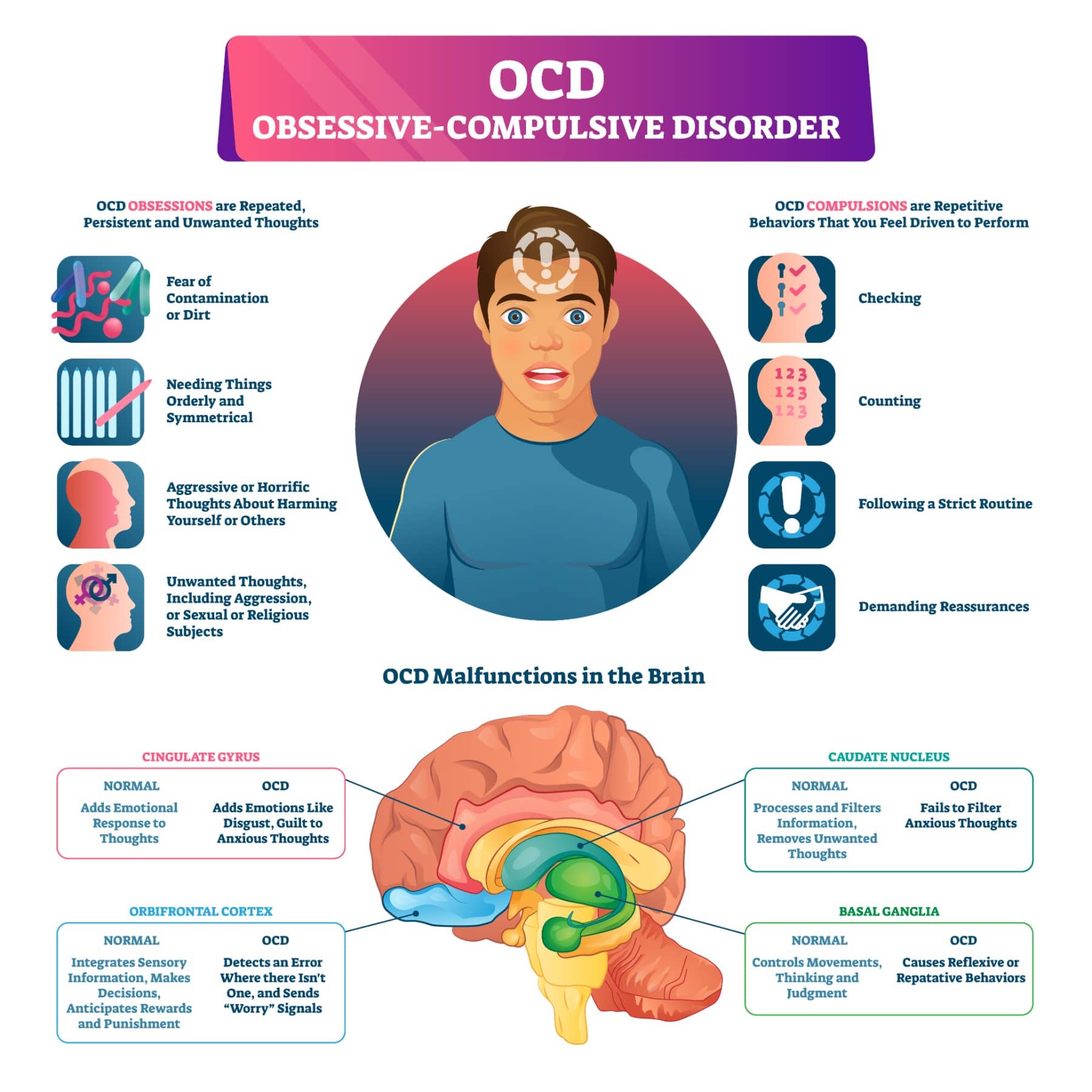Can Mindfulness Cure OCD?
Obsessive Compulsive Disorder (OCD) is a mental health condition that can cause severe distress and disruption to everyday life. Sufferers may experience intrusive thoughts, compulsive behaviors, or a combination. But could mindfulness be the key to managing OCD? In this blog post, we’ll explore the potential of mindfulness to help sufferers manage their symptoms.
Mindfulness is often associated with relaxation and stress relief. It involves focusing on the present moment without judgment, which can help reduce anxiety and improve overall well-being. But can it also help those with OCD? Recent studies suggest that mindfulness-based therapies can be effective in treating OCD symptoms.
Let’s unpack how mindfulness works for people with OCD and how it can add value to a more extensive treatment plan. Also, we’ll look at the benefits and drawbacks of using mindfulness to treat OCD so readers can decide whether this approach is right for them.
What is OCD?
Obsessive-Compulsive Disorder (OCD) is an anxiety disorder characterized by intrusive, persistent thoughts and rituals. People with OCD experience recurring, unwanted, and often distressing thoughts known as obsessions. Common obsessions include fear of contamination, fear of harm to oneself or others, perfectionism, and a need for symmetry. To manage the distress caused by these thoughts, individuals with OCD engage in repetitive behaviors, known as compulsions. Examples of compulsions include excessive handwashing and counting and organizing items in a particular order.
People with OCD can spend hours performing these compulsive rituals daily, significantly interfering with everyday life and causing difficulty maintaining relationships or attending work or school. With proper treatment, however, many people with OCD can learn to manage their symptoms and lead productive lives.
Benefits of Mindfulness
Mindfulness can be a miraculous remedy for those suffering from OCD. It provides a sense of control and stability. Research indicates that mindfulness is one of the most effective ways to reduce disorder symptoms. To say that mindfulness has its benefits is an understatement. Tapping into mindfulness is like unlocking a secret power within yourself.
Mindfulness can help with OCD in many ways, including reducing intrusive thoughts, improving problem-solving skills, and increasing self-esteem. It also allows us to take ownership of our thoughts and feelings and provides an outlet for emotional regulation. Additionally, individuals can develop healthier coping mechanisms to deal with their symptoms by engaging in mindful activities such as yoga or meditation. Finally, they can become more attuned to themselves and their environment by becoming aware of how their thoughts and emotions affect them.
With regular practice, mindfulness can have powerful effects on the mind and body. This can lead to increased happiness and well-being, reduced stress levels, improved concentration and focus, better sleep quality, increased resilience towards challenging situations, greater clarity of thought processes, increased self-compassion and self-acceptance; the list goes on! Mindfulness is truly a fantastic tool for overcoming OCD. It allows individuals to reclaim ownership over their lives once again.
Mindfulness can be a miraculous remedy for those suffering from OCD. It provides a sense of control and stability. Research indicates that mindfulness is one of the most effective ways to reduce disorder symptoms. To say that mindfulness has its benefits is an understatement. Tapping into mindfulness is like unlocking a secret power within yourself.
Mindfulness can help with OCD in many ways, including reducing intrusive thoughts, improving problem-solving skills, and increasing self-esteem. It also allows us to take ownership of our thoughts and feelings and provides an outlet for emotional regulation. Additionally, individuals can develop healthier coping mechanisms to deal with their symptoms by engaging in mindful activities such as yoga or meditation. Finally, they can become more attuned to themselves and their environment by becoming aware of how their thoughts and emotions affect them.
With regular practice, mindfulness can have powerful effects on the mind and body. This can lead to increased happiness and well-being, reduced stress levels, improved concentration and focus, better sleep quality, increased resilience towards challenging situations, greater clarity of thought processes, increased self-compassion and self-acceptance; the list goes on! Mindfulness is truly a fantastic tool for overcoming OCD. It allows individuals to reclaim ownership over their lives once again.
How to practice mindfulness for OCD
The key to using mindfulness to treat OCD is to practice it regularly. An excellent way to start is by attending a mindfulness program or class or working with a coach focusing on mindfulness. This can help you learn the basics of mindfulness and support developing a regular practice. Additionally, many online resources are available such as guided meditations and apps that can help you learn how to practice mindfulness on your own.
It’s important to remember that while mindfulness can help manage OCD, it is not a substitute for other treatments such as medication or psychotherapy. Combining mindful techniques with other therapies may be more effective in reducing symptoms than alone. With this in mind, exploring different treatment options and working with an experienced mental health professional may be necessary to address OCD symptoms fully.
Other Treatments for OCD
Other treatments for OCD are available, but mindfulness alone is not enough to cure the condition. Cognitive Behavioral Therapy (CBT) is a type of therapy that focuses on changing negative thought patterns and behaviors. It’s effective in reducing symptoms of OCD. Exposure and Response Prevention (ERP) is another form of treatment that involves exposing oneself to situations or thoughts associated with their obsessions and resisting the urge to engage in compulsive behavior. Medications effectively treat OCD, such as selective serotonin reuptake inhibitors (SSRIs). These medications can help reduce anxiety related to OCD and make it easier for individuals to follow through with recommended treatments such as CBT or ERP.
3 Key Takeaways about Whether Mindfulness can cure OCD.
Working with a spiritual business coach can be an incredibly rewarding experience. But first, it’s important to identify what goals and objectives you have in mind when working with such a coach.
Having a clear set of goals and objectives helps ensure that you don’t waste time or money on something that may not offer the desired outcome. You’ll need to ask yourself questions like “What am I hoping to achieve by working with a spiritual business coach?” or “What do I want to learn from this experience?” Thinking about these questions will help you establish what areas of your life or business you’d like to see improvement in – whether it be increasing efficiency, gaining clarity on decisions, or improving relationships.
It’s also important to think about whether there are certain values that are important for you to uphold when selecting a spiritual business coach. For example, do you prefer someone who is open-minded and flexible, or someone who is more structured and direct? Taking the time to consider these criteria will help you find the best fit for achieving your desired outcome. When done right, working with the right spiritual business coach can bring new perspectives into your life which can lead to personal transformation and success!
Final Thoughts: Can Mindfulness Cure OCD?
In conclusion, OCD is a complex condition that can be difficult to manage. Although mindfulness has grown in popularity as a potential treatment for OCD, it is essential to remember that it isn’t the only option. There are additional treatments, such as cognitive-behavioral therapy (CBT) or medications, that could help reduce symptoms of OCD.
It’s also worth noting that mindfulness alone may not completely cure OCD symptoms. Combining mindfulness with other treatments can benefit some people, while others need more intensive therapies and additional support. Ultimately, everyone’s experience with OCD is unique; what works for one person may not work for another.
If you think you might have OCD or your current treatment isn’t helping, consulting a mental health professional can help you better understand your options and determine a course of action tailored to your needs. With patience and perseverance, you can find the right treatment plan that helps you manage your symptoms and get back on track to living the life you want.
Adam is a former Fortune 500 senior executive. He is a father, husband, student of life, and “self-awareness” transformational coaching leader.
Talk to Adam for FREE
SCHEDULE A NO OBLIGATION ONE-ON-ONE SESSION
Tell me about where you are in life, and I’ll suggest some tools to help you find new insights. It’s my purpose to serve others, so even if this meeting is our only interaction in life, I get the pleasure of meeting you and living my highest purpose.






